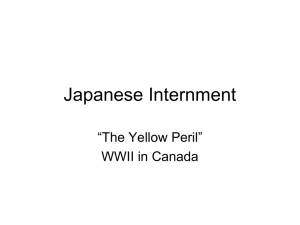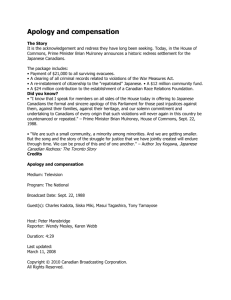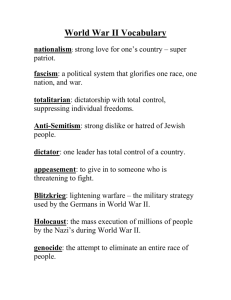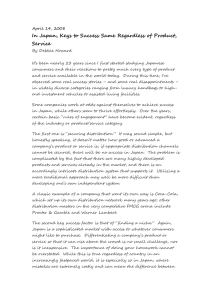Japanese Canadians: Wartime Persecution
advertisement
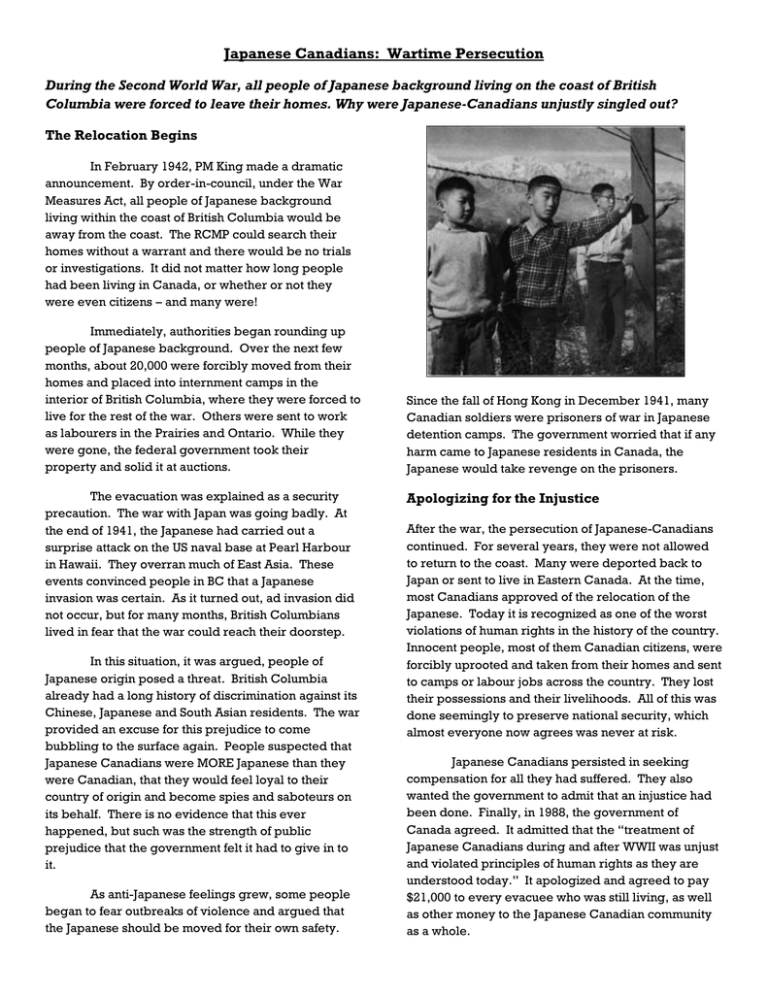
Japanese Canadians: Wartime Persecution During the Second World War, all people of Japanese background living on the coast of British Columbia were forced to leave their homes. Why were Japanese-Canadians unjustly singled out? The Relocation Begins In February 1942, PM King made a dramatic announcement. By order-in-council, under the War Measures Act, all people of Japanese background living within the coast of British Columbia would be away from the coast. The RCMP could search their homes without a warrant and there would be no trials or investigations. It did not matter how long people had been living in Canada, or whether or not they were even citizens – and many were! Immediately, authorities began rounding up people of Japanese background. Over the next few months, about 20,000 were forcibly moved from their homes and placed into internment camps in the interior of British Columbia, where they were forced to live for the rest of the war. Others were sent to work as labourers in the Prairies and Ontario. While they were gone, the federal government took their property and solid it at auctions. The evacuation was explained as a security precaution. The war with Japan was going badly. At the end of 1941, the Japanese had carried out a surprise attack on the US naval base at Pearl Harbour in Hawaii. They overran much of East Asia. These events convinced people in BC that a Japanese invasion was certain. As it turned out, ad invasion did not occur, but for many months, British Columbians lived in fear that the war could reach their doorstep. In this situation, it was argued, people of Japanese origin posed a threat. British Columbia already had a long history of discrimination against its Chinese, Japanese and South Asian residents. The war provided an excuse for this prejudice to come bubbling to the surface again. People suspected that Japanese Canadians were MORE Japanese than they were Canadian, that they would feel loyal to their country of origin and become spies and saboteurs on its behalf. There is no evidence that this ever happened, but such was the strength of public prejudice that the government felt it had to give in to it. As anti-Japanese feelings grew, some people began to fear outbreaks of violence and argued that the Japanese should be moved for their own safety. Since the fall of Hong Kong in December 1941, many Canadian soldiers were prisoners of war in Japanese detention camps. The government worried that if any harm came to Japanese residents in Canada, the Japanese would take revenge on the prisoners. Apologizing for the Injustice After the war, the persecution of Japanese-Canadians continued. For several years, they were not allowed to return to the coast. Many were deported back to Japan or sent to live in Eastern Canada. At the time, most Canadians approved of the relocation of the Japanese. Today it is recognized as one of the worst violations of human rights in the history of the country. Innocent people, most of them Canadian citizens, were forcibly uprooted and taken from their homes and sent to camps or labour jobs across the country. They lost their possessions and their livelihoods. All of this was done seemingly to preserve national security, which almost everyone now agrees was never at risk. Japanese Canadians persisted in seeking compensation for all they had suffered. They also wanted the government to admit that an injustice had been done. Finally, in 1988, the government of Canada agreed. It admitted that the “treatment of Japanese Canadians during and after WWII was unjust and violated principles of human rights as they are understood today.” It apologized and agreed to pay $21,000 to every evacuee who was still living, as well as other money to the Japanese Canadian community as a whole. The Internment of Japanese Canadians Since the first Japanese immigrants came to work on the railways, mines and lumber camps on the West Coast of Canada, they have faced various forms of discrimination. They have been denied the right to vote, teach or take jobs in the civil service. Japan’s attack on Pearl Harbour horrified many Canadians and suddenly Japanese Canadians were seen as spies and enemy aliens. Questions for Comprehension: 1. Give examples of how Canada unjustly treated Japanese Canadians: 2. What similarities are there between the treatment of the Japanese-Canadians and the Jewish people living in Nazi Germany? 3. Was the Canadian government justified in setting up the internment camps? 4. Was the internment of Japanese Canadians the product of paranoia or of racist attitudes in Canada? What can we do in the future to ensure the security of Canada without violating people’s basic human rights?


